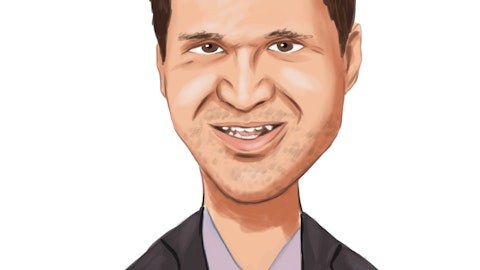Paul Taylor: Good morning, Chris.
Christopher McGratty: Hey. Good morning, everybody. You talked, Paul, about the $975 million getting $10 million. What are your thoughts on €“ I mean, this seems like a restructuring year. Like what are your thoughts on accelerating that with the capital raise?
Paul Taylor: Again, I would say everything is on the table. I think the pricing of our stock has moved up a bit here. In the past week to weeks, but at levels that we’ve been at, it would be €“ I think it’d be very tough to raise stock. But again, that is on the table, but there’s no plan to do that at this point in time. We did raise the preferred stock earlier in the year and that buoyed capital a bit.
William Black: And again, we’d be very thoughtful about the earn back associated with that and shareholder dilution and other options that would dilute shareholders much less.
Paul Taylor: Absolutely.
Christopher McGratty: Great. If I could €“ I think I heard in your prepared remarks, you don’t think you need to add reserves from here. I guess wanted to hear that correctly. And I guess most of your €“ most…
Paul Taylor: Well, I would preface that with this year. We really don’t €“ I mean, as we see it today, we don’t see any need to add any substantial reserves. We feel that we’re adequate. I just talked to our Chief Credit Officer yesterday, and there’s really no signs of any issues with credit quality or any concerns at this point in time. But again, we’re probably going into a recession this year, and that could elevate credit issues, but we don’t know that.
Christopher McGratty: Okay. Yes. I would just think you might get ahead of it just because the investors aren’t buying your stock for current earnings. I get the limitations of CECL, but I’ll step back. Thank you.
Paul Taylor: And again, I just want to make sure it’s very clear that we are very comfortable with our credit position at this time. PacWest is a very, very good credit shop. I’ve only been here a handful of months, but that’s one of my biggest impressions is that PacWest is a very, very good credit shop.
Operator: We’ll go to our next question. Our next question comes from Gary Tenner from D.A. Davidson.
Gary Tenner: Thanks. Good morning, everybody.
Paul Taylor: Good morning.
Gary Tenner: So on the runoff portfolios, Bill, that you laid out in terms of the size of premium finance and multifamily. I assume premium finance €“ I mean that’s a pretty quick runoff right, kind of a pretty short-term portfolio is multifamily, should we assume that’s more about a couple or three years of runoff, but maybe the bulk of it on the front-end?
William Black: So on the multifamily, I would agree that’s a reasonable assumption coming depending upon when things were underwriting and when they mature, it will kind of ebb and flow, but it will kind of pace itself out. Premium finance is a business that, clearly, we’re exiting. We have communicated that to the borrowers, and we’re going to work with them. I wouldn’t expect it to be immediate. It’s not going to be instantaneous, and we’re going to work it out.
Gary Tenner: Is there an opportunity to sell the premium finance business? I think we saw last year or year and a half ago or so, Texas Capital sold at their premium finance business to Truist. Is there any appetite in the market for that kind of business?
Paul Taylor: Well, again, I would say that €“ again, everything is on the table. We look at that, but nothing on that right now.





